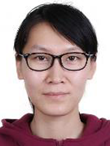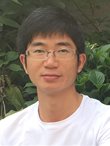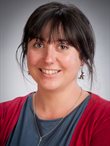 Kate Ashley (née Newton) (PhD, 2014-2020)
Kate Ashley (née Newton) (PhD, 2014-2020)
Kate's doctoral research involved working with organic geochemistry, and sedimentological and physical property datasets to reconstruct the Holocene record of East Antarctic Ice Sheet dynamics.
Dr Yvette Eley (Post-doctoral researcher, 2016-2019)

Yvette is an organic geochemist who focused on reconstructing climate and hydrology during the Cenozoic, the development of new biomarker-based proxies for palaeoclimatology, geobiology and exobiology, and the application of organic molecular and isotopic techniques to modern ecology and conservation. Yvette now works as a Specialist Advisor for Natural Resources Wales.
 Federike Wittkopp (PhD, 2013-2017)
Federike Wittkopp (PhD, 2013-2017)
Frederike’s doctoral research focused on the evolution and variation of the Asian Monsoon since the Neogene and how the Himalaya and Tibetan Plateau uplift influenced the Monsoon. For this, she analyzed marine sediment cores from the Japan Sea (IODP 127,128 and 346) for biomarkers, which were used to reconstruct past temperatures and palaeoenvironments.
 Jingjing Liu (CSC PhD visitor from Shanghai; August-Nov. 2017)
Jingjing Liu (CSC PhD visitor from Shanghai; August-Nov. 2017)
Jingjing is currently completing her PhD at Tongji University, Shanghai, China. She works on the evolution of seawater conditions in the eastern equatorial Pacific over the past 8-Myr, including cold tongue development, water column structure and the relationship between sea surface temperature and global atmospheric pCO2.
 Heiko Moossen (PDRA; 2012-2016)
Heiko Moossen (PDRA; 2012-2016)
Heiko is a chemist specialising in organic geochemistry. He uses stable isotope signatures, to better understand Earth's bio and geosphere, and their interactions. He is particularly interested in biomarkers, geochemical fossils that are ubiquitous in numerous Earth's archives, e.g. sediment cores.
 Canfa Wang (2 year CSC visitor from Wuhan CUG; 2013-2015)
Canfa Wang (2 year CSC visitor from Wuhan CUG; 2013-2015)
Canfa is currently working at the State Key Laboratory of Biogeology and Environmental Geology, China University of Geoscience, Wuhan, China. His research interest is to develop new environmental proxies based on biomarkers and their isotopes and to apply those proxies in different geological archives for palaeoclimate reconstruction.
 Dr Bella Duncan (visiting PhD) from ARC, UVic Wellington (2014)
Dr Bella Duncan (visiting PhD) from ARC, UVic Wellington (2014)
Bella’s research focuses on applying molecular fossils known as biomarkers to reconstruct the climate and environment in Antarctica and the Southern Ocean during periods of global warmth and elevated atmospheric CO2 in the geological past. In particular, her focus is on the Oligocene and Miocene epochs (34-5 million years ago), during which Antarctica was still vegetated, and significant ice volume and sea level variability occurred under global temperatures and atmospheric CO2 levels projected to occur in the coming centuries.
Current workplace - Antarctic Research Centre, Victoria University of Wellington, NZ.
Helen MacKay (visiting PhD from Newcastle; 2014)